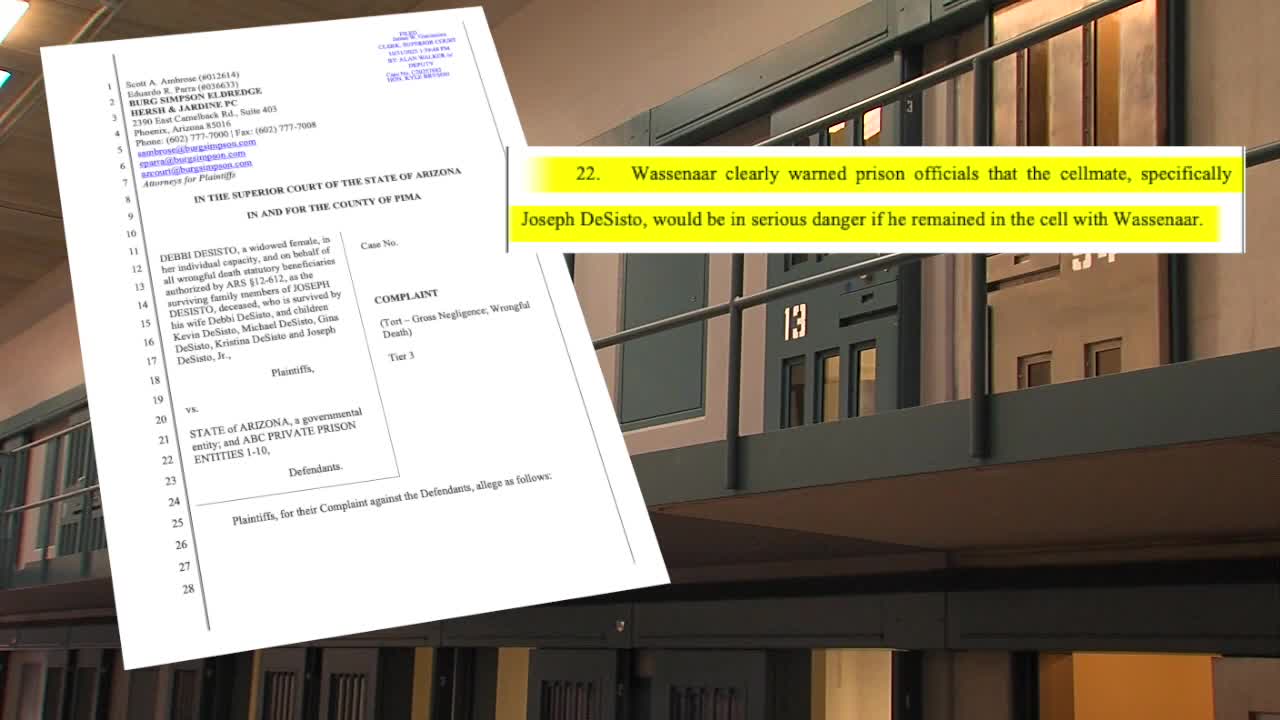TUCSON, AZ — A wrongful death lawsuit filed against the state of Arizona alleges gross negligence in the death of an inmate who died last November at the Tucson prison complex.
Joseph DeSisto died on November 5, 2024, after being placed in a cell with Ricky Wassenaar, who confessed to killing him. The lawsuit claims Wassenaar warned prison officials that DeSisto would be in serious danger if he remained in the cell.
"He gave clear indications that Mr. DeSisto was not only not welcome in his cell, but that he would also be in danger if they placed him in the cell with Wassenaar," said Scott Ambrose, attorney for the DeSisto family with the Burg Simpson law firm.
DeSisto was found in his cell the same evening he was assigned to a room with Wassenaar. Wassenaar was allegedly standing over DeSisto's body and admitted to killing him and allegedly provided details about the murder.
Despite the confession, the Arizona Department of Corrections has maintained they have "no reason to believe" Wassenaar had any involvement in the death of DeSisto.
In April of 2025, the Department of Corrections told ABC15, “The Pima County Office of the Medical Examiner (ME) reported to ADCRR that the death of inmate Desisto was due to the presence of natural causes due to several underlying health conditions. Further, the ME noted that there were no injuries to the body consistent with trauma, including the method of death that inmate Wassenaar claimed to have used. Given this official information from the ME and ADCRR’s investigation indicating the absence of any information demonstrating otherwise, the ADCRR treated and classified Wassenaar according to policy.”
A week later, after ABC15 learned the Pima County Medical Examiner’s Office ruled they were unable to determine an exact cause of death for DeSisto, the Department told ABC15, "the Department has no reason to believe that inmate Wassenaar had any involvement in the death of his cellmate, Joseph Desisto, 81, in early November 2024. The Pima County Office of the Medical Examiner (ME) report detailed inmate Desisto’s significant medical issues and noted that there were no injuries to the body consistent with trauma, including the method of death that inmate Wassenaar claimed to have used. Given this official information from the ME and ADCRR’s investigation indicating the absence of any information demonstrating otherwise, the ADCRR treated and classified the death as one occurring from natural causes.”
"This was a foreseeable and a preventable tragedy," Ambrose said.
Wassenaar, who orchestrated a two-week hostage standoff in an Arizona prison in 2004, spoke about the killing in a phone interview with ABC15 earlier this year.
"Yes, I killed Joe D. Joe DeSisto. I killed him on November 5th, 2024, on election day. I strangled him to death," Wassenaar said. "Any cellmate they gave me was going to die, but particularly, a child molester, a pedophile. I mean, Joe didn't have a chance. They put him in there and then he was going to die.”
DeSisto was in prison for molestation and sexual conduct with a minor, charges for which he was sentenced in 2022. Wassenaar himself was accused of sexually assaulting a prison guard during the hostage standoff, a claim he denies.
The lawsuit alleges that Wassenaar clearly warned prison officials that his cellmate would be in serious danger if he remained in the cell. Wassenaar said he did everything in his power not to have DeSisto in his cell and threatened to harm him.
Read the lawsuit below:
In April of this year, Wassenaar claimed he killed again after being placed back in a cell with another inmate. Three inmates at the Tucson facility died, and this time the Department of Corrections named Wassenaar as the sole suspect.
"They had the physical evidence, three days after that dude's death. As well as my confession to all of it, and they did nothing. They put me back in the cell, and they eventually put another guy in my cell and I killed him as well," Wassenaar told ABC15.
Data from the Arizona Department of Corrections shows inmate assaults on each other and staff members have both increased in recent years.
"I think it's clear based on the interest in this case that there's some underlying systemic failures," Ambrose said. "Human dignity just doesn't end at the prison gates. That's not how society works. That's not how we hold people accountable."
The lawsuit describes DeSisto as a 5-foot-4, 140-pound man who was placed with a large inmate with a propensity for violence despite clear warnings.
"There were clear, present, and specific warnings given to the guards and the prison officials that leaving Mr. DeSisto, a 5'4 guy, 140 pounds, with a large inmate with a propensity for violence, would do harm," Ambrose said.
DeSisto's brother told ABC15 that DeSisto was embarrassed by his incarceration and constantly asked for forgiveness. The family is now seeking accountability after saying they received little information from the Department of Corrections despite multiple requests.
The case now enters the discovery process, where the family's attorney hopes to gather more information that the Department of Corrections has not yet turned over. The family hopes the state will finally provide answers about what happened to their loved one.
"Although we've requested information, we've been provided very little," Ambrose said.
In April, ABC15 also submitted public records requests related to this case and are still waiting for those records to be provided.
This story was reported on-air by a journalist and has been converted to this platform with the assistance of AI. Our editorial team verifies all reporting on all platforms for fairness and accuracy.





